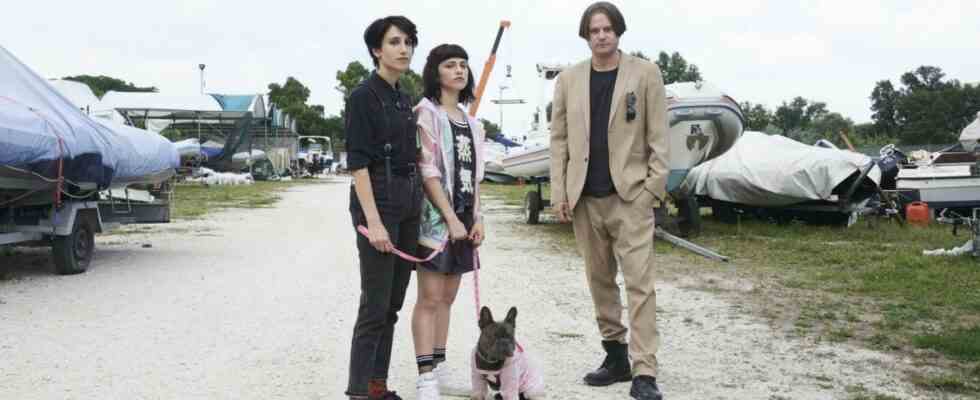At least Ugo is lucky. He is in a red sweater and looks so cute and cuddly that he puts every cat video to shame. Udo is a French bulldog, the kind of dog people pay big bucks for. For the weekend, however, his rich mistress leaves him to a young dog sitter named Marti, who is urgently warned not to subject her darling to any stress. Ugo is sensitive to stress.
Marti (Daphne Scoccia) goes to a park with Ugo, where a gentleman with a cheap suit and a strange pageboy haircut appears. He poses as Dr. Mopsi, his business card says “Tierazt”, which probably means “veterinarian”, but the dubious doctor seems to have forgotten an r. He asks if he can borrow Ugo to have offspring with another bulldog and offers her a lot of money for it.
To say yes here, you have to be pretty burned out and desperate. But everyone is burned out and desperate in this wonderful, funny and yet bitter comedy by director Fulvio Risuleo, who is only thirty-one years old. It is being released in German cinemas under the title “The Whole Coup”. Marti, who can barely pay the rent, gets a whopping thirty-five euros from the stingy owner for dog sitting, so she decides with her partner (Silvia D’Amico), Dr. accept pug’s offer. Soon she is in a chase with the “veterinarian”. He has the – now quite stressed – Ugo on the passenger seat, in the hope of being able to sell the coveted noble bulldog on the black market. Because he needs money too. Urgently.
The cake has long since been distributed here, even the crumbs are out of reach
The Italian film’s staff is reminiscent of the whimsical characters of American indie films. Even under the stress of the chase, the clumsy Marti gives free rein to her love of animals (“oh look, a horse!”), while her annoyed partner speeds down the bumpy Roman suburban tracks in her small car. And then of course there is “Dottore Mopsi”.
The film initially heads towards Ugo’s kidnapping, only to then tell the story beforehand in flashbacks – an absurd accumulation of failure. Orazio, a heavy metal fan, has lost his job at a computer store and is unemployed and suffering from a chronic cough. His brother comes up with the idea of selling the grave reserved for his mother, which Orazio refuses. Then he tries his luck in the dog business. But here, too, all possibilities are in vain, as are the attempts to get close to his neighbor. She also listens to dark music, but unfortunately she has a boyfriend.
Capitalism leaves the characters no choice – they have to think up the most idiotic things
From the outside, one could imagine Orazio’s milieu of beer-drinking metal fans, mechanics, the unemployed and losers in a serious social drama. In Risuleo, however, social criticism arises from an absurdly comic dramaturgy that always lets all economic (and amorous) efforts come to nothing. Capitalism leaves the characters no choice: because everyone is impoverished, they have to think up the most idiotic things, accept the most questionable offers, fall for the cheapest tricks – without being able to gain anything. They may be naïve and poorly spelled, but they are also prisoners of this perpetual cycle. The cake has long since been distributed, even the crumbs are out of reach. The nonsense thus has a political dimension: it is a parable of an Italian youth who has no money in their pockets and little chance of getting any. If there is one, it is usually not worth more than the paper it is printed on.
Risuleo combines the humanism of the losers à la Chaplin with a joy in postmodern storytelling that works with different perspectives, interruptions, flashbacks and ellipses. One thinks of the early Tarantino, whose “Reservoir Dogs” is also told in flashbacks, starting from a coup gone wrong; to Alejandro González Iñárritu’s “Amores Perros”, whose episodes are bound together by an accident in Mexico City and the relationships between humans and dogs. Now both of these films may involve dogs, or allude to them in the title, while their characters slip out of control and take on the fate dictated by the script. Yet Risuleo’s film has something that Tarantino and Iñárritu don’t have: a cute little French bulldog named Ugo who, unlike the poor people panting after her, seems to be lucky.
Il colpo del cane, Italy 2019. – Director and Script: Fulvio Risuleo. Camera: Yuri Fantigrossi. Starring Edoardo Pesce, Daphne Scoccia, Silvia D’Amico. Cairo Film Distribution, 93 min.

